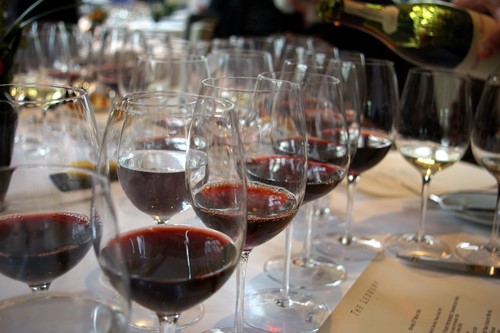The wine trade tasting calendar starts in earnest tomorrow, and we’re entering a busy period, kicking off with far more 2009 Burgundy tastings than anyone can reasonably justify.
If you are any good with google, you’ll be able to find a list of the UK tastings calendar. There are loads and loads of them, mostly London-based. During the peak of the tasting season, you could spend a working week just tasting wine, with two or three tastings a day.
On one level, this is tremendously useful – a free resource which a business card and a bit of fast talking could give you access to for free, even if you aren’t on many invite lists.
But on another level, is tasting 100+ wines in a day going to yield you all that much useful information? If you taste gazillions of wines, you will not perform well. Sensory scientists could tell you this: look at the effort they go to with their panels to avoid fatigue and carry-over effects, in order to get useful data.
Interesting wines demand understanding; they demand attention. It’s perfectly possible to accrue tasting notes of many thousands of wines in a year and publish them, yet – even if you have a good palate – to be publishing nonsense.
We all (as wine writers) think we are special. But can we really be serving our readers well if we’re publishing notes on wine no. 125 of the day when our palates and minds are fatigued, and all we give wine no. 125 is 15 seconds of our attention?
6 Comments on Tasting versus drinking: does the trade get it wrong?



Hi Jamie,
I hate big tastings as you are wrecked afterwards. As a result, if I have to do a really big tasting I taste for non-conformity – either the very good (which I might then blog) or the very bad. Otherwise, I just use the big tasting to give me an overall impression of a region.
Having said that, these tastings are organised by sellers who want to highlight their wines and not for educational purposes so you can see why they put on big tastings.
Bad news at Leicester yesterday – who knows what’ll happen in the replay LOL!
Come on you Spurs!!!
Totally agree with this post – if you give a wine a rating of say 90 based on a minute or two at a big tasting, what’s the likelihood you’d have given it exactly the same rating if you’d had it at a small tasting, or taken more time over it at home? All comes down to the context thing – and obviously the context of a big tasting is very different to the context of your living room. Suppose in an ideal world, wine writers would taste every wine more than once at different times in different contexts (and out of different glasses) before publishing a rating!
Perhaps one of the reasons for the abundance of “big”, obvious wines in trade offerings overall.
In his book “Adventures on the Wine Route” Lynch sums it up perfectly I think.
Hi Jamie
wise words from Tom, and by extension Kermit Lynch (if you haven’t read the book, it is very good, and can be ordered via http://www.abebooks.co.uk). I wonder also, whether it helps to perpetuate the reliance upon scoring systems – with ‘under-pressure’ tasters needing to ‘nail’ their opinion, too often by numerical definition alone – something which Mr Lynch is also well worth reading for.
With the Big Fortified Tasting (www.thebft.co.uk) we recently took the decision not to expand the number of wines on show (well, there are already more than 300) for pretty much the reason you state Jamie. Of course, any event organiser will recognise that almost no one enters a medium-large tasting room with the intention of tasting everything, and equally as tasters that we each should recognise our own genuine limitations, and should avoid making buying decisions or publish recommendations if sailing to close to those limits.
The obvious retort is: what is the alternative? We can enjoy just a very few wines the way they should be enjoyed – and hopefully will be enjoyed by those who buy them: with food, over an evening. A good wine will develop and give off a different range of volatile molecules as time passes. The drinker will get a range of impressions from the wine over time. My own experience, with the best wines, is that the last sip is always the best.
The contrast with hurried tastings and masses of rather similar wine at an early stage of their bottle life is quite stark. It’s like a snapshot of a film just about to begin (OK, the analogy is not perfect, but there you are).
At big tastings I usually bow out after about 50-60 wines. But all the same I must admit: I’d really love to be London based and with time on my hands these days.